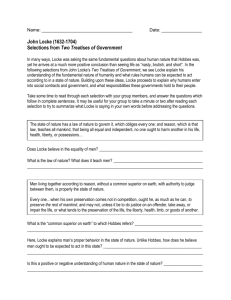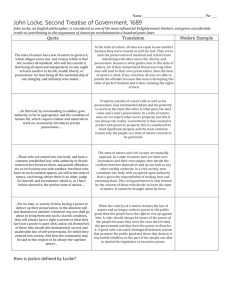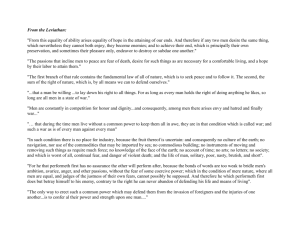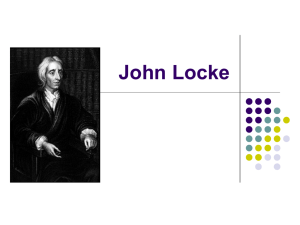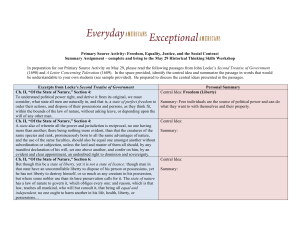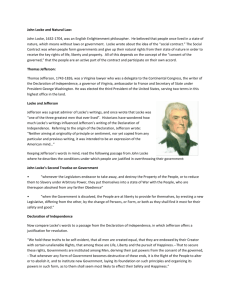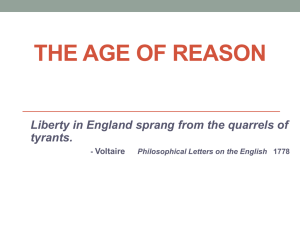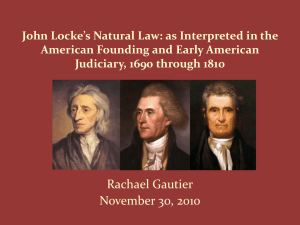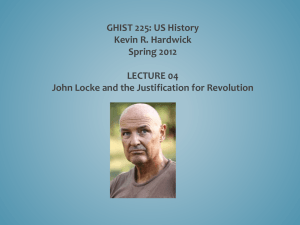PSA Powerpoint and Workshop Agenda
advertisement
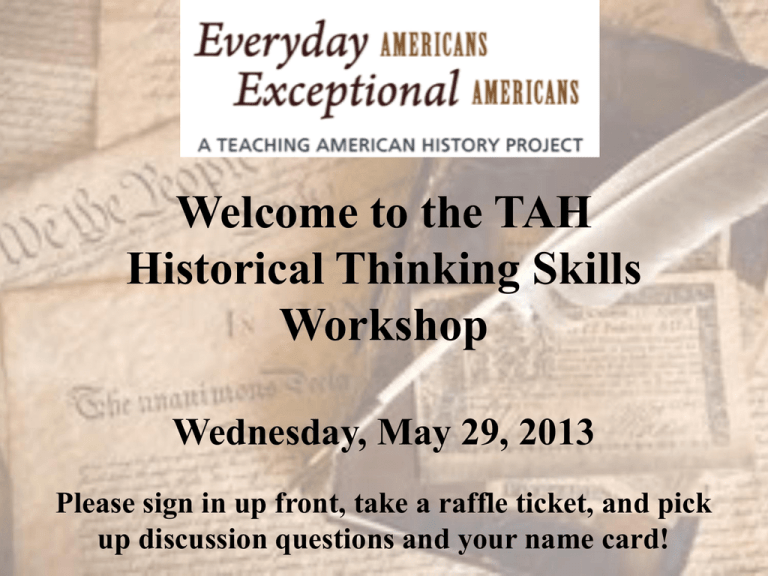
Welcome to the TAH Historical Thinking Skills Workshop Wednesday, May 29, 2013 Please sign in up front, take a raffle ticket, and pick up discussion questions and your name card! Workshop Agenda 8:30-10:00 10:15-12:00 12:00-12:40 12:40-2:10 2:20-3:50 3:50-4:00 Rethinking History Historical Thinking Skills Lunch Defining Freedoms Primary Source Activity: Freedom, Equality, Justice, and the Social Contract Conclusions and Evaluations Primary Source Activity: Freedom, Equality, Justice, and the Social Contract • • • • Introduction Part I – John Locke & Liberalism Part II – Locke & Founding Documents Part III – Extension Activities All materials will eventually be posted on the TAH website. PSA: Freedom, Equality, Justice, and the Social Contract John Locke is considered by many historians and philosophers to be the “Father of Liberalism.” He’s pictured on the left; NOT to be confused with the guy on the right. While there are many influences on the evolution of American democracy, English philosopher John Locke provides a good starting point for investigation of our democratic ideals because he wrote about them at a critical time in the historical development of modern liberalism. We’ll take a brief look at Locke, his times, and some passages of his work (the chart) before moving on to connections with American history. Historical Thinking Skills Questions for John Locke’s Second Treatise on Government Sourcing: *What kind of source is this and when did it appear? *Who is the author? What judgments can we make about him? *What are the author’s motives in writing this document? Contextualizing: *Who is the author’s audience? *What relevant or significant events occurred at the time this document was produced? England’s Glorious Revolution 1688-1689 Freedom (Liberty) • Ch. II, “Of the State of Nature,” Section 4: • To understand political power right, and derive it from its original, we must consider, what state all men are naturally in, and that is, a state of perfect freedom to order their actions, and dispose of their possessions and persons, as they think fit, within the bounds of the law of nature, without asking leave, or depending upon the will of any other man. Equality • Ch. II, “Of the State of Nature,” Section 4: • A state also of wherein all the power and jurisdiction is reciprocal, no one having more than another; there being nothing more evident, than that the creatures of the same species and rank, promiscuously born to all the same advantages of nature, and the use of the same faculties, should also be equal one amongst another without subordination or subjection, unless the lord and master of them all should, by any manifest declaration of his will, set one above another, and confer on him, by an evident and clear appointment, an undoubted right to dominion and sovereignty. Limits on Freedom; Natural Rights • Ch. II, “Of the State of Nature,” Section 6: • But though this be a state of liberty, yet it is not a state of licence: though man in that state have an uncontrollable liberty to dispose of his person or possessions, yet he has not liberty to destroy himself, or so much as any creature in his possession, but where some nobler use than its bare preservation calls for it. The state of nature has a law of nature to govern it, which obliges every one: and reason, which is that law, teaches all mankind, who will but consult it, that being all equal and independent, no one ought to harm another in his life, health, liberty, or possessions… Slavery Violates Natural Rights • Ch. IV, “Of Slavery,” Sections 22-23: • The natural liberty of man is to be free from any superior power on earth, and not to be under the will or legislative authority of man, but to have only the law of nature for his rule. The liberty of man, in society, is to be under no other legislative power, but that established, by consent, in the commonwealth; nor under the dominion of any will, or restraint of any law, but what that legislative shall enact, according to the trust put in it… This freedom from absolute, arbitrary power, is so necessary to, and closely joined with a man's preservation, that he cannot part with it, but by what forfeits his preservation and life together: for a man, not having the power of his own life, cannot, by compact, or his own consent, enslave himself to any one, nor put himself under the absolute, arbitrary power of another, to take away his life, when he pleases. Right to Property • Ch. VI, “Of Property,” Section 27: • Though the earth, and all inferior creatures, be common to all men, yet every man has a property in his own person: this nobody has any right to but himself. The labour of his body, and the work of his hands, we may say, are properly his. Whatsoever then he removes out of the state that nature hath provided, and left it in, he hath mixed his labour with, and joined to it something that is his own, and thereby makes it his property. It being by him removed from the common state nature hath placed it in, it hath by this labour something annexed to it, that excludes the common right of other men: for this labour being the unquestionable property of the labourer, no man but he can have a right to what that is once joined to, at least where there is enough, and as good, left in common for others. Social Contract • Ch. VIII, “Of the Beginning of Political Societies,” Section 95: • Men being, as has been said, by nature, all free, equal, and independent, no one can be put out of this estate, and subjected to the political power of another, without his own consent. The only way whereby any one divests himself of his natural liberty, and puts on the bonds of civil society, is by agreeing with other men to join and unite into a community for their comfortable, safe, and peaceable living one amongst another, in a secure enjoyment of their properties, and a greater security against any, that are not of it. This any number of men may do, because it injures not the freedom of the rest; they are left as they were in the liberty of the state of nature. When any number of men have so consented to make one community or government, they are thereby presently incorporated, and make one body politic, wherein the majority have a right to act and conclude the rest. Law and Justice • Ch. IX, “Of the Ends of Political Society and Government,” Sections 124-126: • The great and chief end, therefore, of men's uniting into commonwealths, and putting themselves under government, is the preservation of their property. To which in the state of nature there are many things wanting. First, There wants an established, settled, known law, received and allowed by common consent to be the standard of right and wrong, and the common measure to decide all controversies between them… Secondly, In the state of nature there wants a known and indifferent judge, with authority to determine all differences according to the established law: for everyone in that state being both judge and executioner of the law of nature, men being partial to themselves, passion and revenge is very apt to carry them too far, and with too much heat, in their own cases... Thirdly, In the state of nature there often wants power to back and support the sentence when right, and to give it due execution… Right to Change Government … when necessary Religious Freedom • A Letter Concerning Toleration: • …because the care of souls is not committed to the civil magistrate, any more than to other men. It is not committed unto him, I say, by God; because it appears not that God has ever given any such authority to one man over another as to compel anyone to his religion. Nor can any such power be vested in the magistrate by the consent of the people, because no man can so far abandon the care of his own salvation as blindly to leave to the choice of any other, whether prince or subject, to prescribe to him what faith or worship he shall embrace. For no man can, if he would, conform his faith to the dictates of another. All the life and power of true religion consist in the inward and full persuasion of the mind; and faith is not faith without believing. Whatever profession we make, to whatever outward worship we conform, if we are not fully satisfied in our own mind that the one is true and the other well pleasing unto God, such profession and such practice, far from being any furtherance, are indeed great obstacles to our salvation. Locke’s Influence on the Founders • How did the ideas expressed by John Locke in late 17th-century England influence the Founders and our country’s founding documents? • What specific evidence is there of Locke’s influence in… *the Virginia Declaration of Rights, *the Declaration of Independence, *the U.S. Constitution, and *the Bill of Rights PSA Groups Classroom 232 with Bill Kendrat Kevin Bartell Nellie Beaman Carrie Clark Mary Doyle Steve Hummer Sue Intili Georgia Leser Emily Martin Amanda Massey Ann McCafferty Nancy Merriman Hannah Oberlander Martha Potts Roxanne Rice Jennifer Rodgers David Snyder Nancy Thomas Lab 235 with Liz Glynn Michele Brigham Diane Chavez Jay Dodson Faith Ibarra Mindi Kaleto Damian Knecht Michael Krepinevich Michele LaFerriere Linda Mejia Alison Morey Brian Papenheim Laura Quindlen Deborah Rice Hannah Robinson Kimberly Rouse Benjamin Scarboro Vic Selestay Finding Connections in the Founding Documents Part I Divide up your team members as follows: • 2 Team Members: Draw upon prior knowledge to answer the historical thinking skills questions (sourcing and contextualizing) for your assigned document on the handout provided to you. • 2-3 Team Members: Work together to close read the document and identify at least three specific connections to Locke’s Second Treatise … using the chart provided. There may not be connections for every concept listed. Finding Connections in the Founding Documents Part II For each of the four document teams: • Taking what you have learned about your document, briefly share your responses to the sourcing and contextualizing questions with the entire group. • Then, briefly share three examples of specific evidence of connections between Locke’s ideas and the concepts addressed in your document. For everyone (after each group has shared): What evidence is there of concept connections across multiple documents? Making Connections Across American History • Within your group, examine the primary sources provided to you and using the historical thinking skills questions as a guide, work together to: *identify how the sources connect with each other *identify what they tell you about the topic • In each case study group, consider how the primary sources build on and/or challenge the concepts expressed in the documents you examined. • All of the case study materials will be available to you on the TAH website. Pre-1865 Extension Topics • Benjamin Banneker and Thomas Jefferson (1790s) • Rebellion against Slavery (1820s/1830s) • Abolition Movement (1780s-1850s) • Woman’s Rights (1848 and beyond) Post-1865 Extension Activities • • • • • Rights of Native Americans Woman’s Rights The Four Freedoms Japanese-American Internment The Civil Rights Movement

